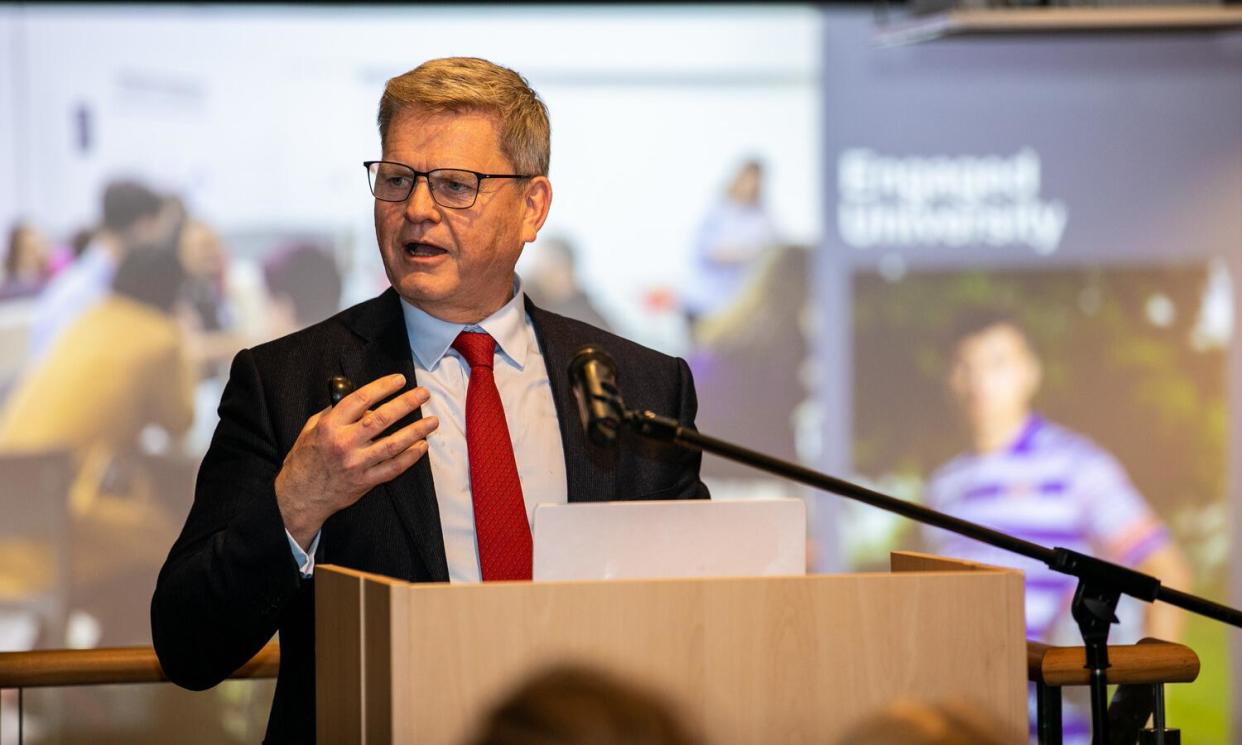Universities must overcome ‘echo chamber’ and self-censorship, says Reading VC

Universities risk becoming “uniformities” of rigid ideas and self-censorship, according to the vice-chancellor of the University of Reading, who accused the government and his fellow university leaders of creating echo chambers on campus.
Robert Van de Noort told a seminar at the Houses of Parliament that vice-chancellors needed “to be more courageous themselves, and actively and explicitly promote a culture of diversity of thought” to overcome an “echo chamber” of academics amplifying identity politics and the government’s accountability measures which rewarded conformity over innovation.
Related: Students can make provocative remarks if they do not break law, watchdog says
Van de Noort said the “fundamental threat” to academic freedom was not that the higher education sector “occasionally” cancelled an external speaker on campus. “Rather, it has everything to do with a broader higher education world that seems to have become one in which one increasingly encounters beliefs or opinions that coincide with one’s own, so that existing views are reinforced, and alternative ideas are not considered,” he said.
“I am not the only vice-chancellor who has noted that colleagues far too often self-censor their views. Because, coming out as being the divergent voice in the echo chamber can feel like a career-limiting move.”
Van de Noort also attacked the government’s use of accountability measures that punished deviation in academic approaches by cutting off access to research funding.
“The desire to do well in official assessments is so important to status and funding that managers have a clear incentive to appoint and promote candidates who show a high degree of conformity and consistency with existing research paradigms, or mainstream pedagogy, rather than seeking out and appointing candidates with divergent views and opinions,” he said.
He claimed that government-backed assessments of economics were renowned for favouring researchers using neo-classical economics “to the exclusion of other theoretical approaches such as feminist or development economics”.
But Van de Noort, speaking at the seminar organised by the Higher Education Policy Institute (Hepi), also accused the University and College Union (UCU) of making staff uncomfortable by focusing more on political issues – such as boycotting Israel or transgender rights – than on its members’ interests.
“Yes, there is a need to ensure high standards of teaching and research, give taxpayers and students value for money, and make universities welcoming for everyone. But we must guard against turning our universities into ‘uniformities’,” said Van de Noort, a professor of archaeology who has led Reading since 2018.
“We need to be bold when protecting academic freedom and we need to tread lightly when entering current debates. If we do not, universities risk becoming less universal and more homogenous, and that’s a big risk to society.”
Nick Hillman, Hepi’s chief executive, said it was notable that vice-chancellors had stopped denying that threats to freedom of speech on campus were a problem, and were now looking to respond.
“What matters most is supporting the academic freedom of university staff and the free speech of students while avoiding the well-laid traps of those who would relish more culture wars and who want nothing more than to embarrass universities as a fraught election approaches,” he said.
With universities about to face new responsibilities on freedom of speech following recent legislation, Hillman warned that some vice-chancellors “could get a shock” if they didn’t adapt quickly.

 Yahoo News
Yahoo News 
